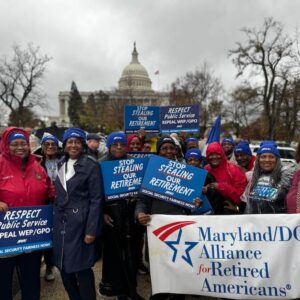June 2, 2008
APWU Testimony Kicks Off Controversy
Recent APWU testimony on Capitol Hill about the Postal Service’s obligation to provide “universal service” to all Americans seems to have stirred up a controversy.
Addressing a House subcommittee on May 8, APWU Legislative Director Myke Reid expressed the union’s concern about actions by the Postal Regulatory Commission (PRC), “which has undertaken, through private contractors, to study the Postal Service’s universal service obligation.”
The PRC has hired contractors who favor privatizing essential USPS operations, Reid testified, noting that the individuals selected have expressed hostility to fundamental elements of universal service — the postal monopoly and uniform rates.
An Innocuous Explanation
Dan Blair, the chairman of the commission, also testified May 8 before the Subcommittee on Federal Workforce, Postal Service and the District of Columbia, but did not address the APWU’s criticisms. At the hearing, he described the study blandly.
Listed among six major PRC initiatives in 2007 and 10 in 2008, Blair included this: “Another critical undertaking this year by the Commission is our work on the Universal Service Obligation Study … which I know is of interest to Members of this Subcommittee.
“The Commission’s review will allow us to evaluate whether to recommend on any changes to universal service and the postal monopoly,” he said, adding that, “The Commission selected the George Mason University School of Public Policy to support completion of the study due to the President and Congress by the end of the year.”
A Different Tune
After the hearing, however, Blair apparently felt compelled to address the union’s concerns. In a letter to the subcommittee dated May 9, he wrote, “Contrary to what some imply, we have not ‘contracted out’ this responsibility.
“We have hired a consultant to assist the Commission in researching the substantial information and background areas required by the law. However, any conclusions, findings, recommendations or policy determinations will be those of the Commission, not of a consultant.
“We will be receiving the consultant’s work in drafts and components parts, not as a single document,” Blair said. “That input will undoubtedly be edited, changed and reconsidered as the report progresses.”
Rebutting the PRC
The APWU has responded with a letter of its own, reminding members of the House subcommittee that the individuals selected as contractors have voiced strenuous opposition to the postal monopoly. The postal monopoly, the contractors assert,
- Makes the Postal Service a victim;
- Corrodes labor relations;
- Intimidates customers;
- Excuses endless political interference from members of Congress; and
- Is the “chain that binds the Postal Service hand and foot.”
In its letter, the union cited testimony by James I. Campbell, Jr. and Robert H. Cohen before the President’s Commission on the U.S. Postal Service, as well as a thesis by Cohen, “Universal Service Without a Monopoly,” to support its assertions.
APWU President William Burrus wrote, “ We respectfully submit that any report to the Congress based on the work of these individuals must be viewed with the utmost skepticism.”
In the May 30 letter to Subcommittee Chairman Danny K. Davis (D-IL) and Ranking Minority Member Kenny Marchant (R-TX), Burrus rebutted Blair’s assertions that minimized the contractors’ role, noting that the PRC’s Request for Proposals requires the contractors to “blend the written documents from the applicable tasks listed above into a comprehensive report to be delivered to the President and Congress.”
Burrus observed, “In light of this record, no amount of rationalization or polite phraseology that may accompany the Commission’s Report should mislead the Subcommittee to believe that the Report has been prepared with an objective or non-partisan view of the issues.”
The Postal Accountability and Enhancement Act of 2006 requires the PRC to “submit a report to the president and Congress on the universal service obligation and the postal monopoly”… “including the monopoly on the delivery of mail and on access to mailboxes.” The report is due in December.


